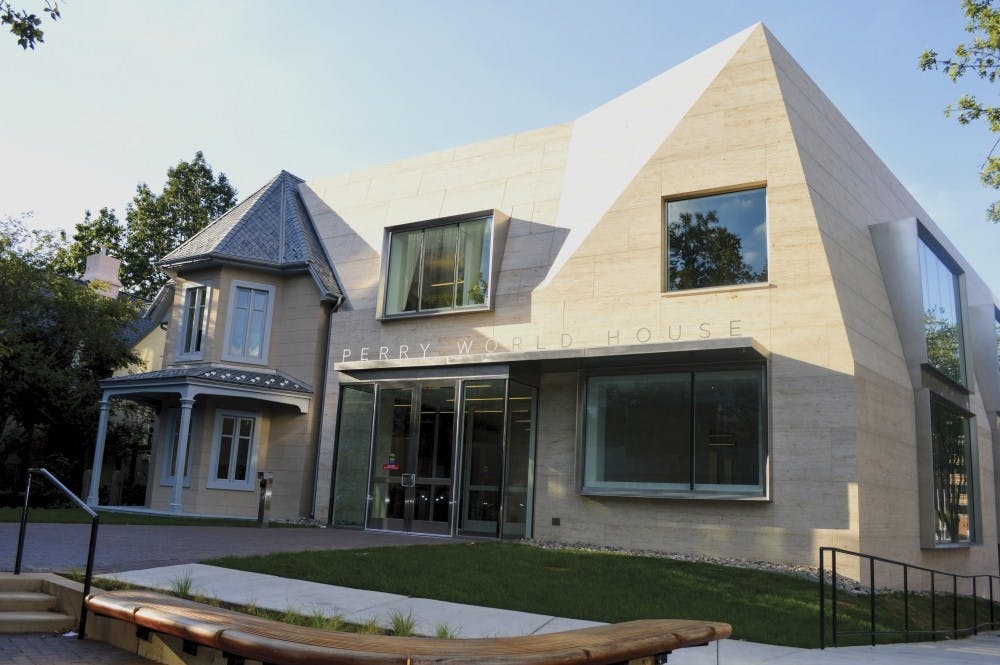
Syrian journalist Zaina Erhaim was scheduled to speak at Penn this semester after being named this year’s "Writer at Risk." However, because of the Trump administration’s travel ban, she has been barred from entering the country.
Erhaim was invited to Penn last summer as part of a new annual program co-sponsored by Perry World House and the Kelly Writers House. The program brings journalists who are “under threat and working in crisis conditions" to Penn to host speaking events. Last year’s inaugural guest was Russian opposition journalist Yevgenia Albats.
Erhaim, who has reported on the Syrian civil war from Syria but now lives in London, received an invitation from the State Department to enter the United States. But after speaking with an immigration officer, she was told that although she is qualified to enter the country, the travel ban prevents her from receiving a visa.
Most Syrian nationals, along with citizens of Iran, Libya, Yemen, Somalia, Venezuela, and North Korea, are not allowed to enter the United States under the current iteration of the ban, which was upheld by the Supreme Court last December.
Although Erhaim has applied for a visa waiver, she is still waiting for a response.
"I was very much ashamed because I couldn't tell the University that I'm not coming up to the very last moment,” she said. “I wish they would have told me, 'OK. No, you're not getting the visa. That's it.' But keeping me pending has ruined all my plans.”
Under the ban, the United States is able to let in people by issuing them waivers on a case-by-case basis, and restrictions vary from country to country. Receiving one of these waivers, however, is notoriously difficult. State Department statistics released last June show that only 2 percent of applicants were issued waivers over the course of five months.
PWH Deputy Director LaShawn Jefferson said that she did not anticipate that Erhaim would have trouble entering the United States.
"It's the oddest thing in the world that the State Department itself invited her, and yet she's been unable to secure a visa from the State Department — so I'm not sure why that is,” Jefferson said.
Jefferson hopes that Erhaim will be able to come to Penn next semester, though she is not optimistic.
Erhaim said she was disappointed that the Supreme Court upheld a law that promotes discrimination.
“The American law has supported that ban without any logical basis, as if being born in an area gives you any kind of 'terrorism genes,'” Erhaim said. "For me what is surprising, first, is that the U.S. law has supported it, and secondly, that the U.S. people have let it go. No one is doing anything against it anymore.”

In July 2017, Penn President Amy Gutmann spoke out against the ban and called it “inimical” to Penn’s values in a statement.
“While we are keenly aware of the need to protect national security, we also firmly believe in our nation’s long-held commitment to the extraordinary value of immigration to our society," Gutmann said in the statement.
If Erhaim cannot physically come to Penn, Jefferson said that they may consider organizing a program where she could participate remotely during the spring semester. PWH and Writers House organizers have another journalist in mind to replace Erhaim, although the journalist is also from one of the countries on the travel ban. Jefferson said that the program may have to be postponed until the next school year.
“[The] people we're choosing are from some of the hottest, most important areas in the world, and those are the very people you can't get here,” Jefferson said.
Writers House Director Jessica Lowenthal also noted the importance of continuing the program and bringing these journalists to Penn, despite the setbacks.
“Journalism and journalists are in crisis,” Lowenthal said. “Limited resources, challenges for fact and truth — it’s the right time to focus on journalism as an important battleground.”
The Daily Pennsylvanian is an independent, student-run newspaper. Please consider making a donation to support the coverage that shapes the University. Your generosity ensures a future of strong journalism at Penn.
Donate



